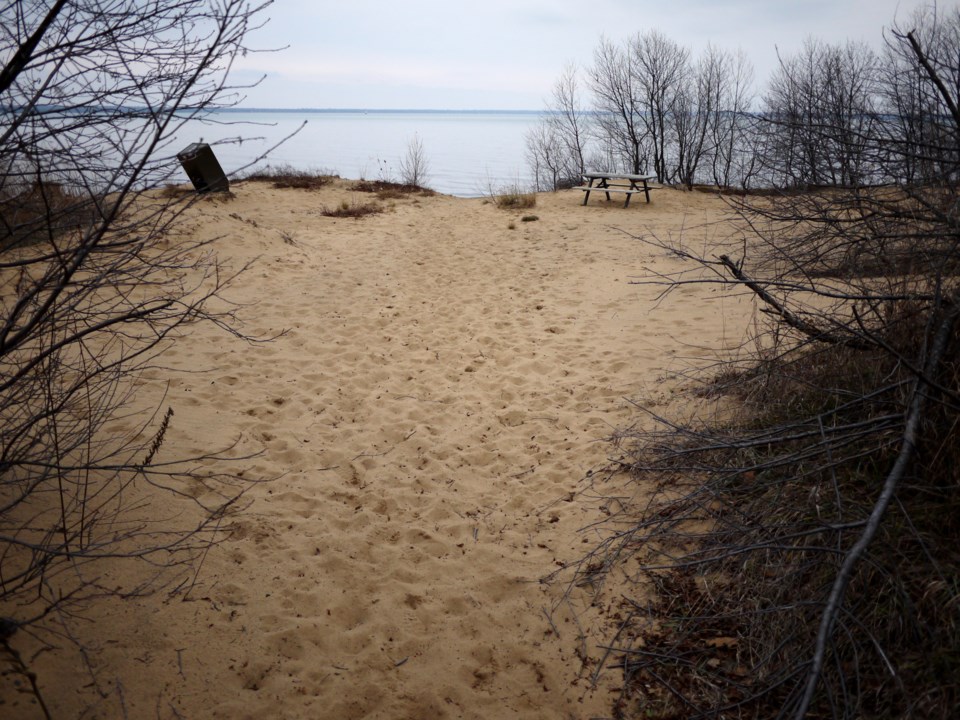Federal, provincial and local governments are combining forces to address issues with benzene in drinking water at Pointe des Chenes.
Over the last 10 days, well water samples have been sought from 66 homes near the Pointe des Chenes campground on Nokomis Beach Road, Des Chenes Drive and Point Des Chenes Crescent.
Officials have known since the fall of 2007 about the elevated benzene levels, which Algoma Public Health (APH) believes originate from fire training exercises at the nearby airport.
"The Sault Ste. Marie Airport has historically conducted fire suppression exercises on its property across from the park by burning fuel," says an APH report dated October, 2008.
"The airport has been monitoring benzene on the property since 1999. A copy of the monitoring report was obtained. The report concluded that contaminant levels had declined and had not left the property," the 2008 APH document said.
Benzene, according to the U.S. National Cancer Institute, is a colourless or light yellow liquid that's found naturally in crude oil.
We're exposed to it in gasoline fumes, cigarette smoke and cleaning products.
"Exposure to benzene may increase the risk of developing leukemia and other blood disorders," the institute says.
Two years ago, Essar Steel Algoma was sufficiently concerned about the chemical that it promised to significantly reduce benzene emissions from its steelmaking operations by 2020.
Ontario's Safe Drinking Water Act allows a maximum of five micrograms of benzene per litre of water.
In the fall of 2007, the provincial environment ministry notified APH of elevated benzene levels at Pointe des Chenes Campground, 20 minutes west of the Sault where the St. Marys River meets Lake Superior.
The popular beach park had already closed for the season then, so further investigations were planned for the following year.
For six consecutive weeks in May and June of 2008, PUC chemical analysis found the carcinogen in concentrations exceeding the province's maximum for drinking water.
The highest level detected was 6.6 micrograms per litre on May 29.
The 2008 APH report says that after learning of the test results on June 3, "the park was immediately contacted and advised to notify all consumers not to drink water, to post access points and to supply safe drinking water."
"The PUC followed up and posted signage at access points and arranged for the delivery of bottled water to the park," the report states.
To determine whether benzene was present in other groundwater sources, the health unit and provincial environment ministry arranged to sample well water from nearby residences for benzene and perfluoroalkylated substances.
All residential samples taken in 2008 were found to comply with provincial drinking water standards, except for one well that had too much sodium.
The new water testing over the past 10 days has been carried out with assistance from Ottawa-based BluMetric Environmental Inc.
Each affected homeowner has received written materials including a fact sheet on benzene and perfluoroalkylated substances.
"It was discovered that the source of the contamination was the Sault Ste. Marie airport site,'" said Tony Hanlon, Algoma Public Health's interim chief executive officer, and Dr. Alex Hukowich, associate medical officer of health, in a risk management report presented this week to the Algoma Board of Health.
"Algoma Public Health will support homeowners once results are received and work with Transport Canada and the Ministry of Environment and Climate Change in mitigation and remediation of the contaminated site itself to ensure residents have safe drinking water," Hanlon and Hukowich said.
The Hanlon/Hukowich risk management report received this week by Algoma Board of Health mentioned only the high benzene readings from 2008.
Interestingly, a recent Transport Canada request for proposals for granulated activated carbon filters to be installed at PUC's Pointe des Chenes water treatment plant, records benzene levels of 13 micrograms per litre in samples of raw and treated water taken June 10 of last year.
That's almost twice the highest levels reported in 2008.
In the document, Transport Canada indicates that the filters are needed "to pilot test the treatment of dissolved benzene concentrations" in the water treatment plant.
'Do not drink' signs at Pointe Des Chenes Campground are inspected and maintained by park staff, public health inspectors and the PUC.
The results of this month's water sampling will determine the future course of action for APH and its government partners, the health unit says.
"APH will not permit the removal of the 'Do not drink' order until adequate data has been presented to ensure its safety," the Hanlon/Hukowich report said.
